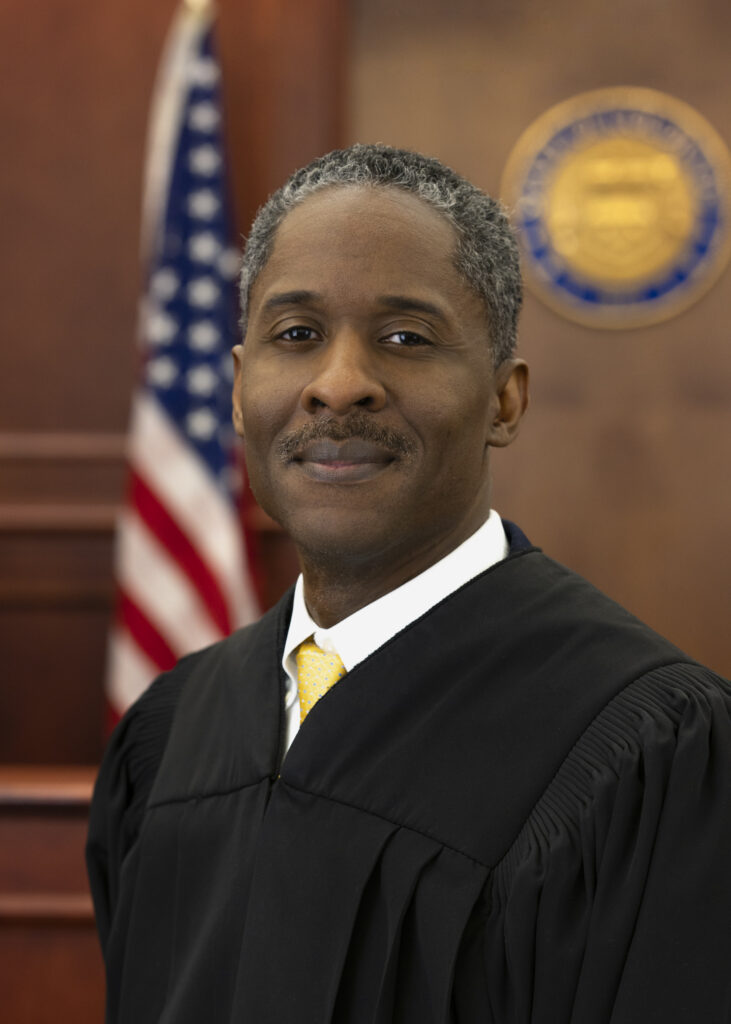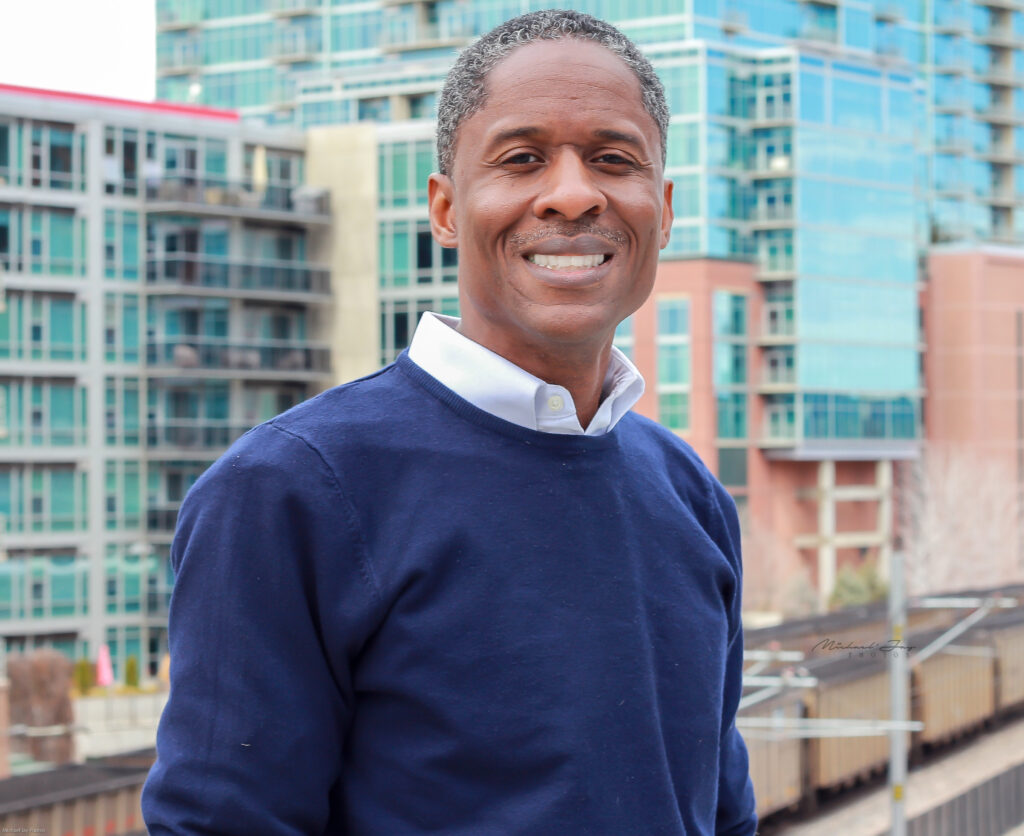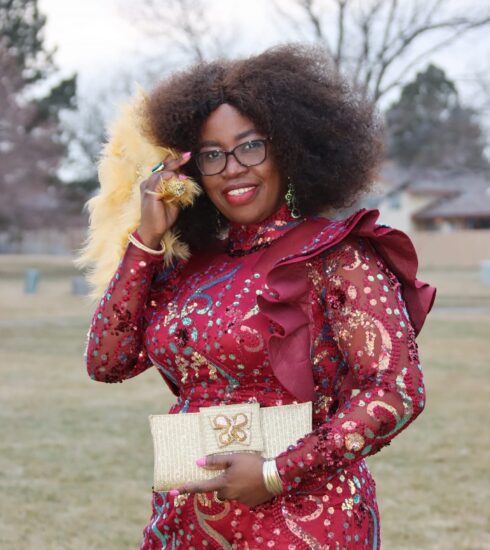“We don’t have many African American judges in Colorado, but I’m unique because I bring my lived experiences to the job.” – Judge Don Toussaint
Judge Don Toussaint is undoubtedly blessed. Listening to his story, you would agree that despite his earlier struggles, the son of Haitian immigrants found the right path and literally mounted up with wings like eagles. He fought distractions, absorbed implicit biases, and remained resilient toward his goal. Born in Newark, New Jersey, and now a District Court Judge in Arapahoe County, Colorado, this affable man is the role model and representation the black community desperately needs in our judicial system. He sat down with Azuka Idam, the publisher of Afrik Digest Magazine to talk about his life, jobs, challenges, and triumphs. Enjoy.

AfrikDigest: Would you give us some details about yourself and your background?
Don Toussaint: My name is Don Jesse Toussaint. I am originally from East Orange, New Jersey, which is about 15 miles west of New York City. I am the youngest son of Haitian immigrants. I have three older brothers and one adopted sister. I moved to Aurora, Colorado from New Jersey in 1991.
I attended Overland High School in Aurora for two years and graduated in 1993. I moved back to New Jersey in the Fall of 1993 and was homeless for 3 months. I spent most of my days at a neighborhood park and at the East Orange Public Library. One day, a librarian handed me a copy of the Princeton Review while I was sitting at a table. As I perused the book, I began to look for schools that were affordable and more likely to accept my low high school GPA. I eventually chose to attend Alabama State University.
While at ASU, I made the Dean’s List and became an Air Force ROTC program student leader. I transferred to the University of Colorado Denver two years later and earned my BA in English Technical Writing.
I married my fiancée in 1999 and worked as a financial services representative with Great West Retirement Services. I earned my master’s degree from Regis University in 2001 and my Juris Doctorate from the University of Denver Sturm College of Law in 2009.
I began my legal career at White and Steele, P.C. from 2010 through 2012. I then served as an assistant city attorney for the city of Aurora from 2012 through 2017. I served as a district court magistrate for the Eighteenth Judicial District from 2017 to 2018. Governor Hickenlooper appointed me to the Arapahoe County Court in 2018 and Governor Jared Polis appointed me to the district court for the Eighteenth Judicial District in 2021. Presently, I preside over the Juvenile Dependency and Neglect division.
AfrikDigest: I read somewhere that your term is coming to an end soon, is that right?
Judge Don Toussaint: Actually, I’ll be on the ballot in 2024. District court judges are on the ballot every six years, but since I’m still in my interim period, I will stand for retention sooner. I got appointed in 2021, so I will be on the ballot during my interim period and then afterward, I will serve a six-year term.
AfrikDigest: Do you mind sharing with us how you got to where you are today?
Judge Don Toussaint: I ran unsuccessfully for the Aurora City Council during my second year in law school. When I lost the race, George Zierk, the Deputy City Attorney at the time, offered me a position as an Assistant City Attorney after I graduate. I accepted that offer a few years after graduation and worked for the city as a municipal prosecutor for five years. In between that time, I was the chair of the Judicial Performance Commission for the Eighteenth Judicial District. The Judicial Performance Commission evaluates judges and makes recommendations to the voters as to whether a judge should be retained. During my tenure as chair of the commission, Colorado Supreme Court Justice Carlos Samour, who was the chief judge in Eighteenth Judicial District at the time, was impressed by my professionalism and leadership. He encouraged me to apply for a vacant Arapahoe County Court judgeship. I was incredibly honored to be asked by the chief judge. I applied and made it to the final three candidates. Governor Hickenlooper chose someone else and I subsequently sought the vacant district court magistrate position. Samour appointed me to that position on June 1, 2017.
Governor Hickenlooper appointed me to the Arapahoe County Court on December 14, 2018, and Governor Polis appointed me to the District Court bench for the Eighteenth Judicial District in January 2021.
So, to make a long story short, I didn’t plan on being a judge. I didn’t even think about it. Had it not been for Justice Samour who saw something in me and encouraged me to apply, I wouldn’t have done it.
AfrikDigest: How has it been so far since you didn’t plan to be a judge from the start? Do you think it’s been worth it?
Judge Don Toussaint: It is an incredible honor and privilege to serve the residents of Arapahoe County and the greater Eighteenth Judicial District. I enjoy the challenge and the opportunity to do my part to better my community. With that said, the job is extremely difficult. Every day I am making tough decisions that directly impact people’s lives. It is extremely stressful and demanding. As a judge, I take every case individually. I really study it and pray about it, and I try to make the best decisions possible. Oftentimes, these cases keep me up at night. I easily work 65 to 70 hours a week.
Right now, I preside over a juvenile dependency and neglect docket. For anyone who doesn’t know what juvenile dependency and neglect is, there are situations where a parent is going through some type of struggle. These struggles could be drug and alcohol abuse, mental health issues, or poverty. The Department of Human Services will intervene and try to provide services to that parent. Sometimes for the children’s safety, DHS will remove the child from the parent’s custody and place them in foster care.
So that’s what I’ve been doing for almost two years. I preside over that type of caseload. Most of the parents that appear before me are not bad people per se. They are just struggling with difficult issues, such as alcoholism, substance use, mental health, domestic violence, and poverty. Since the Covid 19 pandemic and the influx of dangerous substances like Fentanyl, reaching these families and providing them the services they need to overcome their challenges have been difficult. I work hard to not see them as just a name on my docket. I work diligently to see them as my neighbors. Unfortunately, quite a few of them will be unable to overcome their vices, and that is where difficult decisions will have to be made. There are no cookie-cutter answers to these problems. I work to be thoughtful and compassionate. In every case, I look to see what is “just” and balance that with “mercy.” At the end of the day, it is what is in the child’s best interest that I must determine.
Unfortunately, society is not getting better. Many families are suffering in our communities and the resources that we rely on are strained. That is why I have been trying to work with churches, community organizations, and people in our community to get them involved in this fight. I try to let them know that we need people to volunteer and help as many families as possible. It is well documented that black, brown, and indigenous children are overrepresented in the child welfare system. There are cultural challenges that many of these children have that the Department of Human Services, the courts, or other service providers may not be aware of. It is incumbent on the community to engage and connect with these families and provide them with emotional and social support. I say all the time, “but for the grace of God…go I.” I can count over a dozen times when I could have been trapped in an endless cycle of despair, drug addiction, or crime. If it had not been for people who intervened in my life during those critical moments, I too could have been lost in the system. So, I try to pay it forward and help as much as I can.

AfrikDigest: What does your work as a judge entail?
Judge Don Toussaint: I work about 65 to 70 hours a week. My docket consists of juvenile dependency and neglect cases. On docket days, I can hear upwards of 31 to 35 cases for the entire day. Attorneys will appear before me and provide reports and make recommendations on each case throughout that day. I have between 200 to 240 cases that I’m responsible for, which is about 425 children. I have to make sure every child is safe, ensure every parent’s due process rights are protected, and make sure that the process is fair. I preside over three bench trials a week and a couple of jury trials a month. These trials range from temporary custody hearings, placement hearings, adjudicatory matters, and parental termination trials.
If the Department of Human Services is seeking to terminate the parent-child legal relationship, they have to bring that case to me and prove by clear and convincing evidence that the parent is unfit, unlikely to be fit in a reasonable amount of time, and there are no less drastic alternatives. As you can imagine, these types of matters are emotionally charged. There can be upwards of five or six parties involved, and each party can have its own position. As the judge, I must be impartial and weigh each position fairly. Afterward, I must decide what would be in the child’s best interest. That is not an easy task. That type of responsibility weighs on me. I have had more sleepless nights than I can count. The decision I make will impact that child for the rest of his or her life. It is a tremendous responsibility that requires a high level of discernment.
AfrikDigest: Do you think it is important to inquire from a child, especially if the child is not so young?
Judge Don Toussaint: I’ve talked to children as young as eight or nine years old, but most of the children that I do talk to are teenagers. It is important that I hear from them and get their input. After all, it is their lives that will be impacted.
AfrikDigest: Do you sometimes have recourse to the siblings of the family, like a spouse’s sister or even cousin, or other relatives adopting the children instead of total strangers?
Judge Don Toussaint: Let me explain the entire process because that will give you an idea of how it works. So, for example, if there’s some type of issue going on in the home, the Department of Human Services gets involved. Typically, they will try to do it voluntarily, and tell the parents, “Here are the resources that we have available for you.” If that does not work and the county decides that it’s unsafe for that child to remain in the home, the county will then ask me to sign an order to remove the child from that home.
Once I sign that order, within 72 hours, everyone must appear before me in court. The county will then state the reason why the child should remain in their temporary custody. The parents, usually through their attorneys, will either contest or agree to the temporary custody to DHS. If they contest, we will have an immediate contested temporary custody hearing.
At the conclusion of the hearing, I make specific findings of fact and decide whether the child should remain in DHS temporary custody or be returned to the parent. As with every decision, the safety and well-being of the child are paramount.
The next stage of the case is the adjudicatory stage. This is when a determination on whether the child is deemed dependent or neglected is made. The parent can contest this issue before me in a bench trial or ask for a six-person jury trial.
In the event the child is deemed dependent or neglected, the final stage is the dispositional hearing. At this stage, the parent is given a “treatment plan.” The treatment plan is designed to provide the parent with services to make him or her a fit and proper parent. A treatment plan can consist of therapy, maintaining contact with DHS, substance use treatment, and mental health treatment.
Pursuant to the Colorado Children’s Code, the goal is to reunify the family. However, as I said previously, there are situations that it may not be feasible. If that determination is made, then a decision on the permanency of the child will be litigated.

AfrikDigest: How does your work as a judge align with your personality type?
Judge Don Toussaint: Well, that’s a good question. Obviously, I’m a little different from other judges. You do not see too many African American judges in our court system. There are over 500 judicial officers in Colorado and probably 20 or so are African American. Besides that, what makes me unique is that I bring my life experiences to the role of a judge. At the start of this interview, I mentioned that I grew up in East Orange, New Jersey. East Orange is what I would call a “working man’s town.” Most of the children in the public school system are in a free or reduced lunch program. Unemployment is much higher than the national average, and like other cities with these challenges, the crime rate is relatively high.
Growing up in the late seventies, eighties, and early nineties, I’ve seen it all. I was here, in Denver, during the early years of the street gangs that migrated from Los Angeles and I was present during the summer of violence. So, I know what addiction looks like. I know how poverty feels. I know how crime affects communities. When I’m on the bench and I’m dealing with a population of people who are going through struggles, whether its poverty, homelessness, drug addiction, alcoholism, or domestic violence, I have a frame of reference. When I meet with these people in the courtroom, I can use a level of compassion and empathy when making my decision. Now that does not mean that I’m lenient. Every decision I make is thoughtful and deliberate. I work to hold everyone accountable for their actions, and at the same time, being mindful that everyone is not perfect. I do not use a “one size fits all approach” to my cases. That is being lazy and antithetical to what a judge should be. Rather, I deal with each case individually and fairly. This is what my oath of office requires of me and it is my intention to uphold that oath every day that I am on the bench.
Afrik Digest: Can you tell us about your successes and disappointments so far in your journey?
Judge Don Toussaint: Growing up in New Jersey was quite tough. As I said earlier, my parents emigrated from Haiti. Back in the seventies and eighties, thousands of Haitians were coming to the United States to escape political unrest and poverty. Most settled along the eastern seaboard, like Miami, the New York City metropolitan area, and Boston. At the time (and presently) Haitians were marginalized. I was born seven years after the 1967 Newark riots. During that time, East Orange and many other urban communities suffered from deindustrialization, redlining, over-policing, and disinvestment of the public school system. During the mid-1980s, we had the crack cocaine epidemic, high unemployment, and rising crime.
The teachers and administrators who were in my life at the time had very low expectations of me. Most of my elementary and middle school years were spent in remedial classes and my self-esteem suffered. Predictably, I struggled academically. The thought of going to college was not even in my purview.
My life changed when I moved to Aurora, Colorado, and attended Overland High School. For the first time in my life, I had educators who not only looked like me but also believed in my potential. My high school principal, John Buckner, was African American and really pushed me to succeed. In fact, he insisted that I participate in the city of Aurora Teen Court program. Twenty-two years later, he nominated me to the Eighteenth Judicial District’s Judicial Performance Commission. Quite literally, if it was not for John Buckner, I would not be a judge today. There was also my assistant principal, Dr. Sandra Seale. Dr. Seale was the first African American Ph.D. I had met. She routinely checked on my grades and offered me academic advice during my junior and senior years. Lastly, there was the school’s activities director, Patricia Rolles. She functioned as my adoptive mother and looked after me, as well as many other African American students.
Hindsight is 20/20, so I do not typically look at my disappointments as a negative thing. What I went through growing up as a child was part of my journey. I am just grateful that I had, and still have, angels looking over my shoulder and guiding me through life.

AfrikDigest: What are the biggest challenges you are facing?
Judge Don Toussaint: The biggest challenge I am facing as a judge is the growing distrust residents in my community have toward our government institutions. In the past few years, public confidence in our justice system has deteriorated in many marginalized communities. Fairness and impartiality have been questioned; trust in the criminal justice process is in doubt; and many see the criminal justice system’s promise to serve the public as disingenuous. I have decided to dedicate my judicial career to building trust and confidence so that everyone is treated fairly and compassionately. Aside from the challenges as a judge, I believe that maintaining a strong family in a society that can oftentimes be inhospitable to families is a challenge. Thankfully, I have a strong, loving, and supportive wife and two incredible children. If anything, building a strong family foundation for future generations of Toussaints will be my legacy.
AfrikDigest: What advice would you have for other people with dreams like yours?
Judge Don Toussaint: The four things I would tell any person who is striving to better him/herself is to: 1) be persistent in what you want in life; 2) seek out mentors and champions who are dedicated to your success; 3) surround yourself with positive influences; and 4) ignore the naysayers. Most importantly, stay humble and compassionate for the least among us.
AfrikDigest: It’s been a delight talking to you, thank you so much for your time.
Judge Don Toussaint: It’s been my pleasure.






